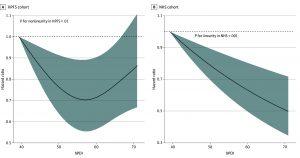A recent study examined the effects of healthy and unhealthy plant-based diets on the risk of developing gout, providing critical insights into the role that dietary choices play in managing this painful condition. Gout is an inflammatory arthritis that results from the accumulation of uric acid crystals in the joints, which can cause significant discomfort. While many dietary interventions have been explored to reduce the risk of gout, this study specifically compared two distinct plant-based diets: one that emphasized whole, minimally processed foods, and another that included processed plant-based foods.
Further Reading: Impacts of diet choice on your immune system
The research found that individuals who adhered to a healthy plant-based diet — rich in fruits, vegetables, legumes, and whole grains — had a significantly lower risk of developing gout. These foods are known for their anti-inflammatory properties and their ability to maintain healthy uric acid levels. In contrast, the study also revealed that an unhealthy plant-based diet, which included refined grains, sugary drinks, and processed plant-based products, was associated with an increased risk of gout.

Figure: Figure 1.. Dose-Response Associations of the Healthy Plant-Based Diet Index (hPDI) and Gout Incidence HPFS indicates Health Professionals Follow-Up Study; NHS, Nurses’ Health Study.
The researchers emphasized the importance of dietary quality when adopting a plant-based diet. Simply removing animal products from the diet does not automatically reduce the risk of gout if the plant-based alternatives are highly processed and lack essential nutrients. The study suggested that focusing on nutrient-dense, minimally processed plant foods is key to preventing the accumulation of uric acid and avoiding gout flare-ups.
This research has important implications for dietary guidelines and patient management, especially for individuals at risk of developing gout. By prioritizing whole, unprocessed plant foods, individuals can significantly reduce their risk of experiencing painful gout episodes. The findings align with broader trends in nutritional science that advocate for plant-based eating as a method of managing chronic inflammatory conditions.
Future research is necessary to explore the long-term effects of these dietary patterns on gout and other metabolic diseases. Nonetheless, this study provides a strong foundation for recommending healthy plant-based diets to prevent gout and improve overall health.
Journal Article: Rai, Sharan K, et al. “Adherence to Healthy and Unhealthy Plant-Based Diets and the Risk of Gout.” JAMA Network Open, vol. 7, no. 5, 21 May 2024.
Summary by Faith Oluwamakinde










